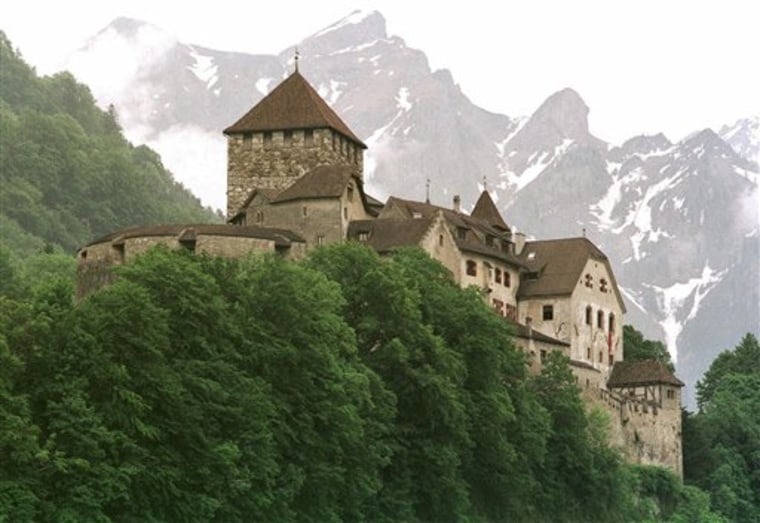"Who pays?" asks a neon artwork in wealthy Liechtenstein's elegant black granite cube of a museum.
That question is of more than artistic interest to the family that rules the tiny principality and their 35,000 subjects. Prince Alois agreed earlier this month to start following the rules set down by the Organization for Economic Cooperation and Development in Europe aimed at curbing tax havens — like his scenic patch of mountain valley between Switzerland and Austria, which owes much of its prosperity to its role as a place to put money.
Liechtenstein is hardly alone.
With governments around the world straining to pay for bailouts and fiscal stimulus, some 35 or so offshore tax havens — from Britain's Channel Islands Jersey and Guernsey to the Cayman Islands in the Caribbean — are under increasing pressure to let in more light.
One by one, they're caving in.
"We're in the middle of a power struggle, and the big countries can do what they like," said Michael Lauber, chief executive of the Liechtenstein Bankers Association.
A study by the Boston Consulting Group estimated that $7.3 trillion is stashed in offshore banking centers by people either taking advantage of low taxes or simply evading notice of tax authorities back home. Curbing havens is one of the issues facing the Group of 20 summit on the world economic crisis, which gathers rich and leading developing countries in London on April 2.
Germany's Finance Minister Peer Steinbrueck spoke last year of using "the whip" against tax havens. Fellow German politician Franz Muentefering made the undiplomatic remark that "in the old times one would have sent in troops ... We have to be rid of tax havens."
Last year, German tax investigators launched a series of raids after paying 5 million euros ($7.9 million) for a CD-ROM containing the names of hundreds of Liechtenstein bank customers. One of them was Deutsche Post chairman Klaus Zumwinkel, who got a year's suspended sentence and a fine of 1 million euros.
For years, tax evaders have been spooked by rumors that German intelligence agents lurk outside Liechtenstein banks to record license plate numbers.
German authorities even began a tax investigation earlier this year against Prince Max, the younger brother of Prince Alois and the chief executive of the country's biggest bank, LGT Group, for allegedly failing to meet fiscal obligations at his residence in Germany.
Neighbor Switzerland has also agreed to give more information to governments chasing people hiding income behind banking secrecy laws.
The pressure rose with the election of President Barack Obama, who as a U.S. senator co-sponsored legislation with Senator Carl Levin, a Michigan Democrat whose bill is designed to crack down on havens estimated to cost the United States $100 billion annually in lost revenue. The bill, still in Senate committee, proposes money-laundering sanctions against countries that impede U.S. tax investigations, as well as heavy fines for those who use or promote illegal tax havens.
Similar sanctions have been pushed recently by Germany and France, prompting a domino effect of countries offering to give up some information in order to avoid being blacklisted as secretive and uncooperative tax havens.
The changes could cost Liechtenstein plenty, and it's not clear that cracking down on it and neighboring Switzerland won't simply drive money to even less transparent countries.
Liechtenstein banks alone manage some $200 billion, while the principality's anonymous trusts control several times that much abroad. That money helped transform Liechtenstein from an austere Alpine backwater about twice the size of Manhattan into a major financial center with the highest gross domestic product on the planet — $118,000 per person.
In a sign that Liechtenstein is preparing for a new era, construction cranes dot the landscape and advertisements have sprung up touting the principality as an all-year tourist destination.
The government proudly cites a deal it reached with Washington last year that will eliminate double-taxation for Liechtenstein's non-financial companies, including Ivoclar Vivadent, the world's biggest manufacturer of false teeth, and Hilti AG, one of the biggest makers of power tools.
However, experts such as Florida tax lawyer William M. Sharp say the victory some are claiming over tax havens may be short lived. While the flow of untaxed money to places like Switzerland and Liechtenstein will diminish, new destinations are emerging in Asia and the Middle East that will be harder to crack, he says.
Gerhard Roth, a managing partner at the Swiss law firm GHR, says the best weapon against tax evasion is lower taxes.
"Reasonable people know that the state deserves a third of their income because it finances a country's infrastructure," he said. But in countries such as Germany, where the top tax rate can be over 50 percent, some people feel justified in taking their money abroad, he added.
